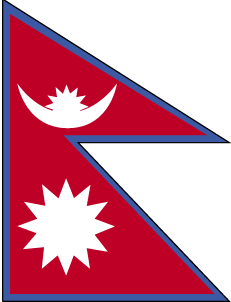All foreigners, except Indians, must have a visa. Nepali embassies and consulates overseas issue visas with no fuss. You can also get one on the spot when you arrive in Nepal, either at Kathmandu’s Airport or at road borders: Nepalganj, Birganj/ Raxaul Bazaar, Sunauli, Kakarbhitta, Mahendranagar, Dhangadhi and even the funky Kodari checkpoint on the road to Tibet. All tourist visas are multiple entry as standard.
A Nepali visa is valid for entry for three to six months from the date of issue. Children under 10 require a visa but are not charged a visa fee. Your passport must have at least six months of validity. Citizens of South Asian countries and China need visas, but these are free.
You can download a visa application form from the websites of the Nepali embassy in Washington, DC (www.nepalembassyusa.org), London (www.nepemassy.org.uk) or Canberra (www.necan.gov.np).
To obtain a visa upon arrival by air in Nepal you must ï¬ll in an application form and provide a passport photograph. Visa application forms are available on a table in the arrivals hall, though some airlines (like Thai and Qatar) provide this form on the flight. The process can take up to an hour, depending on the numbers. To get a jump on the immigration queue, you can download the visa-on-arrival form from immi.gov.np/download/app1.pdf. A multiple entry visa valid for 15/30/90 days costs US$25/40/100. At Kathmandu’s Tribhuvan Airport the fee is payable in any major currency, but at land borders officials require payment in cash US dollars; bring small bills.
If you are just planning a lightning visit to Kathmandu then it’s possible to get a nonextendable one-day transit visa at Kathmandu’s airport for US$5, as long as you have an air ticket out of the country. Transit visas are nonextendable.
Don’t overstay a visa. If you do it’s far better to get it sorted out in advance at Kathmandu’s Central Immigration Office than at the airport, as the long delay could cause you to miss your flight. Officials at the airport can only process overstays of less than 15 days, any longer and you will be sent back into Kathmandu and lose all chance of catching that plane. Fines are US$3 per day if you have overstayed less than 30 days (plus a US$2 per day visa extension fee).
It’s a good idea to keep a number of passport photos with your passport so they are immediately handy for trekking permits, visa applications and other official documents.
VISA EXTENSIONS
Visa extensions are available from immigration offices in Kathmandu and Pokhara only and cost a minimum US$30 (payable in rupees only) for a 15-day extension, plus US$2 per day after that. To extend a multiple-entry visa add on US$20. If you’ll be in Nepal for more than 60 days you are better off getting a 90-day visa on arrival, rather than a 30-day visa plus an extension.
Every visa extension requires your passport, money, one photo and an application form. Collect all these before you join the queue. Plenty of photo shops in Kathmandu and Pokhara can make a set of eight digital passport photos for around Rs 250.
Visa extensions are available the same day, normally within two hours, though some travellers have paid an extra Rs 300 fee to get their extensions within 10 minutes. For a fee, trekking and travel agencies can assist with the visa-extension process and save you the time and tedium of queuing.
You can extend a tourist visa up to a total stay of 150 days within a calendar year, though as you get close to that maximum you’ll have to provide an air ticket to show you’re leaving the country. You can get up-to-date visa information at the website of the Department of Immigration (www.immi.gov.np).
INDIAN VISAS & RE-ENTRY ENDORSEMENTS IN NEPAL
Many travellers get an Indian visa in Nepal but it’s not a straightforward process. Visa applications must be made at the India Visa Service Centre (4001516; www.nepalsbi.com.np/indian_passport; 9am-noon Mon-Fri), at the State Bank of India to the right of the embassy, not at the embassy itself. Get to the gates before 8.45am and get a number or you won’t be seen before noon. After ï¬lling in a telex form (take a black pen) and paying Rs 300, you need to return on a specified date (generally three working days later) with a visa form and one photo. Visas are then issued between 4.30pm and 5.30pm the same day. A six-month tourist visa costs Rs 3250 and a 15-day transit visa costs Rs 1700, plus a Rs 250 service fee. US citizens can get a 10-year tourist visa for Rs 11,500. Transit visas are issued the same day (no telex required), but start from the date of issue and are nonextendable.
Travellers theoretically need a re-entry endorsement to re-enter India within two months of their last visit, even with a multiple-entry visa. If you are flying to Nepal via India you should be able to get a waiver from Indian immigration on ï¬rst arrival if you show your itinerary. The safest thing is to get an endorsement from an Indian embassy, though this involves another layer of bureaucracy and a fee (Rs 700 at the Indian embassy in Kathmandu). It’s generally easier to arrange all this in your home country.
